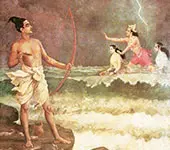The 9th mantra of the dwitiya valli of the prathama adhyaya of Kathopanishad -
नैषा तर्केण मतिरापनेया प्रोक्तान्येनैव सुज्ञानाय प्रेष्ठ ।
यां त्वमापः सत्यधृतिर्बतासि त्वादृङ्नो भूयान्नचिकेतः प्रष्टा ॥
Yamaraja says -
This intellect seeking self-realization should never be destroyed by arguments. You must remember that the direct experience of truth, when shared by a realized person is true knowledge. To understand this, taking the support of the wise is appropriate. They take the trouble to guide you for your benefit. They already understood the truth. What need did they have to teach you this knowledge through words? It is the result of their compassion. Out of kindness, they give us this teaching.
In such a situation, is it wise to reject their teachings with petty arguments? A person works hard for hours to churn butter from milk and places it before you. Then, out of foolishness, you find faults and reject it. Who could be more foolish than you? Kind sages give you teachings to free you from the bondage of the world. They show you a true and simple path to attain real knowledge. Yet, you reject it with arguments.
By doing this, you harm neither the teaching nor the teacher. You only harm yourself. Therefore, if you wish for your welfare, reject arguments and quietly follow the path shown by the wise.
Then Yamaraja appreciates the genuine curiosity of Nachiketas.
'Dear child, Nachiketas! The true intellect you have gained (through my boon) is the one useful for self-knowledge.'
By this, Yamaraja means that you should use reasoning, but not wicked arguments. Use reasoning to understand. Do not argue to reject the subject or prove it wrong. By such arguments, the one teaching you will not lose anything, but you will lose what you were meant to gain.
How should you reason? Kathopanishadgives Nachiketas as an example. Nachiketas also questions and doubts but with curiosity and sincerity. He asks, ‘What happens after death? Does something remain or not?' Such questioning is out of true curiosity. Be curious, but do not argue with arrogance. This will happen when you, like Nachiketas, remain committed to truth. Only a wise seeker of truth can question with curiosity.
Those who wish for false praise or want to be called ‘scholars’ in front of people use wicked arguments. They make pointless arguments to prove their importance. They try to show that no one can answer them. Being stubborn for truth is good, but stubbornness for falsehood is foolish. Rejecting truth with arrogance harms no one but yourself. Even if people praise you for such arguments, how will it benefit you?
Therefore, you must remain committed to truth. Finally, Yamaraja says, 'Nachiketas, is there anyone else in the world who asks questions like you? Surely not!' This teaches us that worldly distractions will attack your sincerity, but you must endure all attacks and stay firm. Never let your curiosity waver. That is your true welfare.
Yamaraja is pleased with Nachiketas’s sincerity. So, without being asked, he shares the deepest secrets with him. Nachiketas is a child, and before the Vedas, all people in the world are like children.
Lessons -
- Avoid Petty Arguments
Self-realization cannot be achieved through pointless arguments. True knowledge comes from the guidance of realized souls who teach out of compassion. Rejecting their wisdom with arrogance harms only you, not the teaching or the teacher. - Question with Sincerity and Curiosity
Use reasoning to understand, not to argue or prove others wrong. Nachiketas questioned Yamaraja with genuine curiosity and sincerity, not pride. This is the correct way to seek knowledge. - Stay Committed to Truth
Be firm in seeking truth. Do not let arrogance or distractions misguide you. Like Nachiketas, stay sincere and unwavering. This dedication will help you gain real wisdom and true welfare.
Comments
Read more comments
Knowledge Bank
The seven realms in Hindu cosmology
The seven realms in Hindu cosmology, Bhū, Bhuvaḥ, Svar, Mahar, Jana, Tapaḥ, and Satya, each have distinct characteristics and significance. Bhūloka is the earthly realm where humans, animals, and plants exist, characterized by physical existence and material experiences. Bhuvaḥloka, the atmospheric realm, is the space between the Earth and the Sun, home to semi-divine beings and spirits. Svarloka, the heavenly realm of the gods, is a place of pleasure and celestial beings associated with Indra, often referred to as Svarga. Maharloka is the realm of great sages and saints, a higher spiritual realm for beings with significant spiritual advancement. Janaloka, the realm of the progenitors of humanity, is inhabited by rishis and divine beings who have transcended the cycle of birth and death but are not yet fully liberated. Tapoloka, the realm of meditation and penance, is occupied by ascetics and sages engaged in deep meditation and austerities for higher spiritual goals. Satyaloka, the realm of truth and the highest spiritual realm, also known as Brahmaloka, is the abode of Brahma, characterized by truth, purity, and eternal bliss, and is the ultimate goal for souls seeking liberation (moksha). These realms represent different levels of existence and consciousness, from the physical and material to the highest spiritual and divine.
Subramanya mantra benefits
Chanting of Subramanya mantras gives courage and confidence. It gives good health, long life and intelligence. It also wards off evil powers.
Recommended for you
Dasharatha's Ashwamedha Yaga Begins

Ashwamedha Yaga is very elaborate. Precision is very important in this. Learn about some of its intricacies....
Click here to know more..King Vikramaditya and a Mystical Love Story

Discover a celestial tale of love, courage, and selflessness.....
Click here to know more..Kausalya Nandana Stotram

dasharathaatmajam' raamam' kausalyaanandavarddhanam . jaanakeevallabham' vande poornam' brahmasanaatanam ......
Click here to know more..